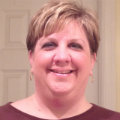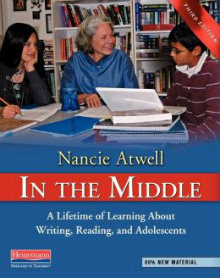Atwell’s “In the Middle,” Fully Revised, Remains a Classic
As this review was being prepared for publication, the Varkey Foundation announced that Nancie Atwell is the winner of the 2015 Global Teacher Prize.
In the Middle: A Lifetime of Learning About Writing, Reading and Adolescents (Third Edition)
By Nancie Atwell
(Heinemann, 2015 – Learn more)
A child lies like a grey pebble on the shore until a certain teacher picks him up and dips him in water, and suddenly you see all the colors and patterns in the dull stone, and it’s marvelous for the stone and marvelous for the teacher.” Elizabeth Hay

Nancie Atwell refers to the above quote toward the very end of her iconic book In the Middle, and it sums up so much of what this book is about. Atwell’s passion for middle school reading and writing permeates every page of this book. This classic has been reworked with over 80% new material, but one thing remains unchanged: Nancie Atwell has created a masterpiece that walks readers through the intricacies of successfully teaching middle schoolers about reading and writing.

Throughout this book, Atwell walks the reader through the layers of preparation, planning and logistics of working with students during reading and writing workshop. For those teachers unfamiliar with a workshop setup in class, Atwell offers this information:
Traditional methods for teaching English put the teacher and the assignment at center stage: as an organizational structure, it’s familiar and obvious. In a workshop, teachers have to structure the space and their instruction to support both a whole-group lesson and the independent activity of two dozen or more individuals. Here, being organized means figuring out what writers and readers will need to grow and providing plenty of it in a setting that’s predictable and reliable.”
Atwell shares that she has transformed herself from an English teacher (with all the knowledge and authority) to a coach and facilitator of the writing process, which is essential to workshop. She emphasizes that teachers must continually be learners as well, and that learning and knowing it all is simply not possible, as any English teacher would easily agree.
As guidance, she gives this question: what do I really need to know? That question seems to guide her writing as she covers a wide range of topics for teachers’ use in the English classroom.
Among the incredible range of topics covered thoroughly in this book are:
- the role of the teacher in workshop
- why choice in reading material matters so much for students
- the needs of student writers
- the importance of booktalks and enlisting student help in giving them
- expectations and rules for reading and writing workshop
- using a poem as an entree for good writing
- the importance of students reading 30 minutes nightly for homework
- numerous wonderful minilessons for the craft of writing
- why teachers should openly model writing in front of their students
- incorporating word study and spelling
- using poetry effectively in workshop
- guidelines for conferencing with students about their writing
- using letter essays to discuss what students are reading
- how students can lead their own self-assessment
- details for studying numerous genres, including memoirs, short fiction, advocacy journalism, profiles and parody, among others
- appendices with quotes to inspire, sample student records, peer conferencing and editing checklists and possible substitute plans to use with workshop
Any teacher who picks up this book will find powerful information for setting up reading and writing workshop, but even if a teacher doesn’t incorporate all of the workshop suggestions, there are literally hundreds of ideas and forms and samples of ideas that can be used and adapted as desired.
The number and variety of lessons and tips found in In the Middle will help any English teacher, but especially those who see the promise in the pebbles of their students and work to polish and discover the talent innate in each of them.
Jenni Miller is a 6th grade Language Arts teacher at Montevideo Middle School in Penn Laird, Virginia. She is in her 21st year of teaching there and absolutely loves reading and writing with her middle school students every day. She also loves Pinterest and frequently pins for middle school teachers and students alike. She can be found at www.pinterest.com/jmillermms and on Twitter @soosen.






























